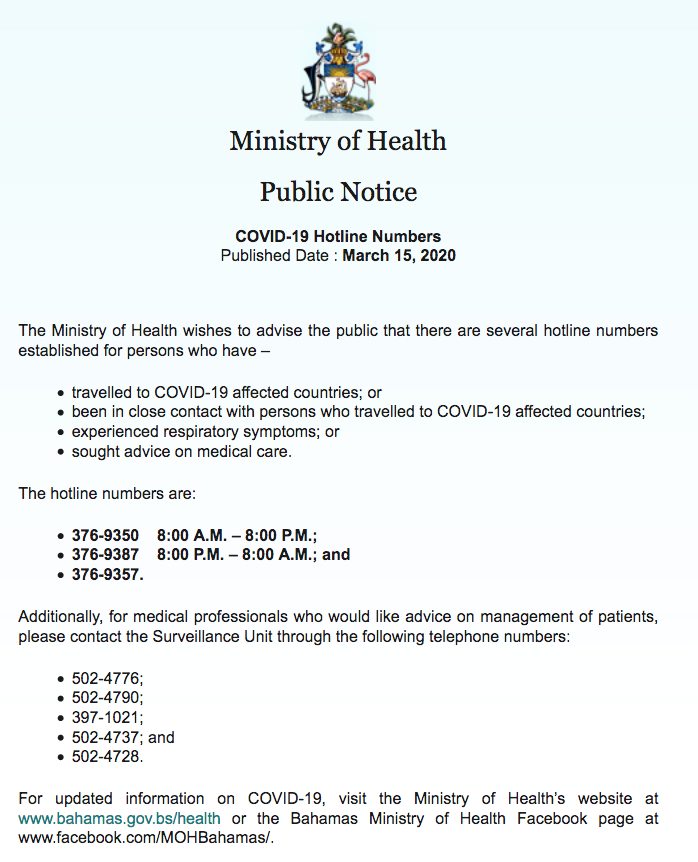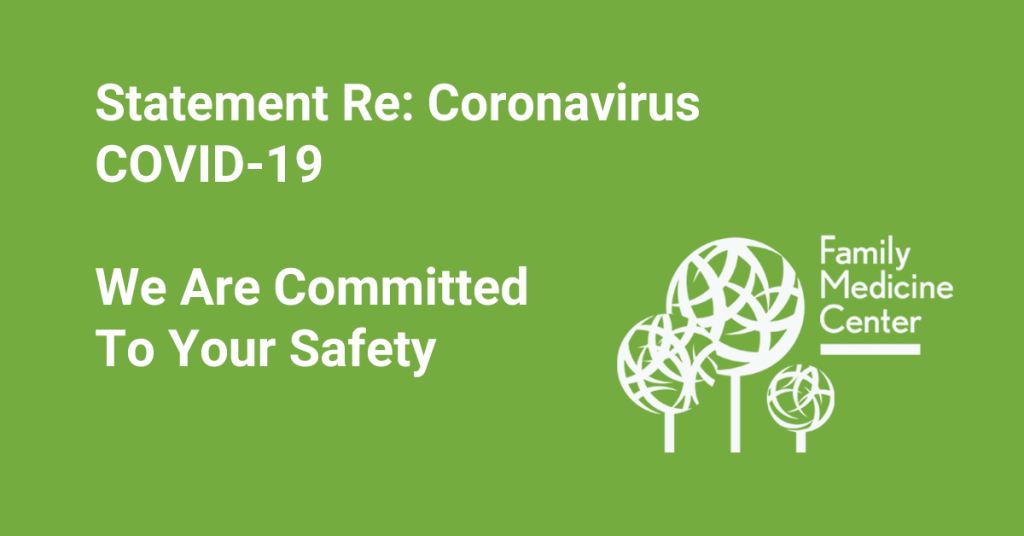Family Medicine Center is committed to ensuring the safety of its patients and staff.
FMC is following international and local recommendations to ensure that we limit the potential exposure of patients to Covid-19.
We will continue to update policies and procedures in an effort to help maintain the health of our community.
Should you have concerns or questions please contact Dr. Cates at 702-9310 422-4991 or gcates@familymedicinecenter.org
What you can do
It is understandable to feel helpless when faced with a barrage of concerning news reports and social media updates regarding COVID-19. The good news is that there are some key steps you can take to help protect you and your loved ones and help prevent the spread of respiratory illnesses, including COVID-19:
- Avoiding close contact with people who are sick
- Avoiding touching your eyes, nose and mouth
- Staying home when you are sick
- Covering your cough or sneeze with a tissue, then throwing the tissue in the trash
- Cleaning and disinfecting frequently touched objects and surfaces, including your phone, computer, remote controls and doorknobs
- Washing your hands often with soap and water for at least 20 seconds, especially after going to the bathroom, before eating and after blowing your nose,
- coughing or sneezing
- Using an alcohol-based sanitizer with at least 60% alcohol if soap and water are not readily available (Always wash hands with soap and water if hands are visibly dirty)
- Practicing social distancing behaviors, including working from home, avoiding public gatherings and unnecessary travel, and maintaining a distance of approximately six feet from others when possible.
What NOT To Do
We’re committed to everyone’s safety. This virus spreads rapidly. Help us minimize potential exposure to other patients by not coming into a clinic or hospital to be tested. Please call us at 702-9310 or 422-4991 first to find out how to be evaluated.
What to do if you are experiencing symptoms
Call ahead before visiting your doctor
If you have a medical appointment, call the healthcare provider and tell them that you have or may have COVID-19. This will help the healthcare provider’s office take steps to keep other people from getting infected or exposed.
For non-emergency needs, if you need medical attention due to respiratory illness symptoms (fever, cough, shortness of breath) and plan to visit our clinic, or a any medical facility, please call ahead before you go and let them know that you are experiencing symptoms that may possibly be related to COVID-19. This will allow healthcare providers to properly prepare for your visit and take the necessary precautions to keep others from being infected or exposed.
Please be reassured that our top priority is the health and well-being of our community – including you. We are are taking all the steps recommended to ensure everyone’s safety and we encourage you to follow the guidance above and stay tuned to updates from the Bahamas Ministry of Health and the CDC to help protect you and your loved ones. Keeping our community healthy is a community effort, and we are committed to doing everything we can to keep our community healthy today and for generations to come.
For more information and to stay abreast of the latest updates on COVID-19, continue to visit our website or Facebook page, the Bahamas Ministry of Health and www.cdc.gov.
Hygiene Reminders from the CDC:
• Clean your hands often
• Wash your hands often with soap and water for at least 20 seconds especially after you have been in a public place, or after blowing your nose, coughing, or sneezing.
• If soap and water are not readily available, use a hand sanitizer that contains at least 60% alcohol. Cover all surfaces of your hands and rub them together until they feel dry.
• Avoid touching your eyes, nose, and mouth with unwashed hands.
• Take steps to protect others
• Stay home if you are sick, except to get medical care. Learn what to do if you are sick.
• Cover coughs and sneezes
• Cover your mouth and nose with a tissue when you cough or sneeze or use the inside of your elbow.
• Throw used tissues in the trash.
• Immediately wash your hands with soap and water for at least 20 seconds. If soap and water are not readily available, clean your hands with a hand sanitizer that contains at least 60% alcohol.
• Wear a facemask if you are sick
• If you are sick: You should wear a facemask when you are around other people (e.g., sharing a room or vehicle) and before you enter any medical facility. If you are not able to wear a facemask (for example, because it causes trouble breathing), then you should do your best to cover your coughs and sneezes, and people who are caring for you should wear a facemask if they enter your room.
• If you are NOT sick: You do not need to wear a facemask unless you are caring for someone who is sick (and they are not able to wear a facemask). Facemasks may be in short supply and they should be saved for caregivers.
• Clean and disinfect
• Clean AND disinfect frequently touched surfaces daily. This includes tables, doorknobs, light switches, countertops, handles, desks, phones, keyboards, toilets, faucets, and sinks.
• If surfaces are dirty, clean them: Use detergent or soap and water prior to disinfection.
Bahamas Ministry of Health Hotline numbers


